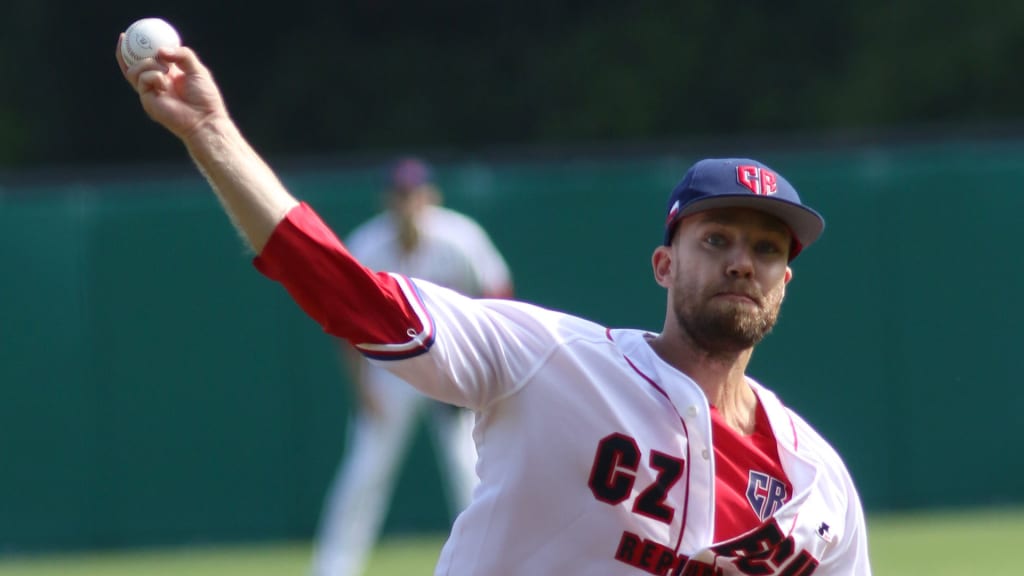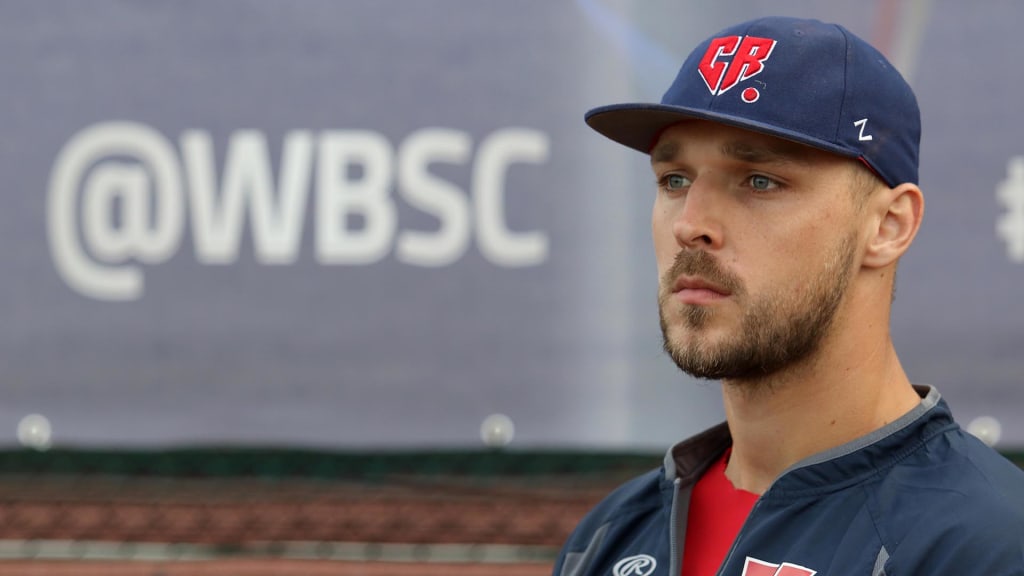Martin Schneider is a firefighter. Matej Hejma is a lawyer. Radim Chroust is a doctor.
And they play for the Czech national baseball team, which has risen to 16th in the World Baseball Softball Confederation rankings -- and is poised to continue its climb.
If you were unaware that baseball has become a serious sport in the homeland of hockey heroes Jaromir Jagr and Dominik Hasek, this is a great time to learn. The Czech Republic opens play March 20 at the World Baseball Classic Qualifying Round in Tucson, Ariz., with a strong chance to finish among the top two teams in Pool 2 and reach the newly expanded 20-team field at the 2021 Classic.
The Czechs have been on the verge of a breakthrough for years. At a qualifying tournament prior to the 2017 Classic, they nearly stunned Mexico before losing, 2-1, to the Adrián González-led hosts in Mexicali. More recently, the Czechs finished 3-2 at an Olympic qualifying tournament last September and almost edged Israel for the European confederation’s berth to Tokyo.
Czech manager Mike Griffin is a former top hitter on the Canadian junior national team whose playing career ended prematurely due to injuries. Now he leads a program that includes current Minor Leaguers Martin Cervenka (Orioles catcher) and Viktor Vecerka (Royals left-handed pitcher). The majority of the roster, though, consists of players who work jobs outside of baseball while earning no more than the equivalent of a couple thousand dollars per year in the Czech Extraliga.
“We’ve got players with families, and they’re taking vacation time from their jobs to play for our country,” Cervenka said in a telephone interview this week.
Cervenka, 27, has decided to remain in Orioles camp rather than play in the Qualifier, in order to compete for a job in the organization and improve his chances of becoming the first Czech-developed player in the Majors. If Cervenka makes his Major League debut this year, he will provide the perfect coda to the first century of Czech baseball.
Next year marks the 100th anniversary of the first known baseball game in the former Czechoslovakia, held in the city of Pilsen. Later in the 1920s, Czechoslovak Olympic Committee member Joe First returned to his home country after studying at Springfield College in Massachusetts. First learned about baseball in the U.S. and popularized the game among students at a YMCA camp he operated in Sobesín. The kids there called it “groundball.” (Logical name, even if it wouldn’t apply quite as well today.)

Baseball cycled in and out of the public consciousness in the former Czechoslovakia over the subsequent decades. At one point, the communist government banned the sport. The end of the Cold War removed any taboo around baseball, and the game began to grow, particularly in the cities of Prague and Brno.
For many years, the Czech team was known in Europe for predominantly left-handed lineups. Why? Many Czech baseball players had prior experience in hockey, the beloved national sport. Right-hand-dominant athletes often shoot a hockey puck left-handed, because that grip involves placing the stronger hand on top of the stick. For the sake of consistency, athletes who play hockey left-handed often swing a baseball bat left-handed. (This has been true in Canada, as well.)
But it’s a testament to the Czech program’s success under Griffin that there’s been better right-left balance in his recent lineups. The team features more baseball players than good athletes who happen to play the sport. Nick Leto, the Royals executive who signed Vecerka from baseball-loving Brno, said he admires the small-ball style and resilient approach that are common among Czech players.
In fact, Vecerka’s opportunity to pitch in the Royals' system has a direct link to MLB’s efforts to grow the sport in Europe. Leto and Royals assistant general manager Rene Francisco scouted the 19-year-old Vecerka at a showcase held in conjunction with the inaugural MLB London Series last summer. Francisco and Leto saw Vecerka throwing in the low 90-mph range -- and signed him on the spot.
Right-hander Boris Bokaj, one of the top Czech pitchers, is fond of saying that he didn’t choose baseball. Rather, baseball chose him. Bokaj first dreamed of being a hockey goaltender like Hasek, until his sister pointed out a baseball field during a bus trip to their hometown of Ostrava. She asked if he’d like to try the sport. Bokaj was 12 years old and had no idea what baseball was.
“I fell in love with it immediately,” Bokaj told MLB.com this week, “so a big thank you to my sister for sure.”
Jakub Hajtmar, a 32-year-old infielder, was introduced to baseball when his father bought two gloves, a bat, and a ball.
“We started playing catch outside of our house, without even knowing the rules of baseball,” Hajtmar said this week. “I just liked to catch, throw and hit the ball.”
Hajtmar tried out for the youth team at the popular club Draci Brno when he was 9 years old -- and he has been part of the organization ever since.

The next step to draw more Czech athletes into the sport is success in the World Baseball Classic. The March tournament marks the country’s third attempt to qualify. The first effort, in the fall of 2012, did not go well. In fact, the Czechs didn’t win a game, losing 16-1 to Germany and 12-5 to Great Britain. Mike Cervenak, a Michigan native who played for the World Series champion Phillies in 2008, remembers angrily staring down a German player for his jubilant home run trot during the lopsided game.
When Cervenak returned to the dugout, he encountered teammates who didn’t share his competitive contempt for what was occurring.
“They were happy to be there and be able to wear the Czech jersey,” said Cervenak, who qualified for the roster through his Czech heritage. “When Mike took over, the perspective changed. You had to earn your spot on the roster.”
Griffin had spent several years as an MLB International instructor, including in China, and believed in the potential he’d seen among Czech players. When the Czech Republic’s federation offered Griffin the job as manager of the national team, he insisted on some conditions: He wanted to continue making his home in North Carolina and travel as needed, while maintaining his role with the PRO5 Baseball Academy in Holly Springs, N.C. The federation agreed, and Griffin took over in March 2014.
“We had a plan, and it mostly focused on developing the players and the culture around them,” Griffin said. “We talked a lot about character, teamwork, and doing this together. We had to make the sacrifices necessary to take Czech baseball to another level, and the players have really embraced that. We had to create an environment where we gave more opportunities to young athletes and inspired everyone with a bigger vision.
“After about two years, the biggest step was that, every time they stepped on the field, they believed they could win. We’ve started coming over to the U.S. for Spring Training to compete with Double-A and Triple-A teams. Now they understand what it takes to play at this level. They have belief.”
For good reason, too: The Czech Republic won last summer’s European qualifier for the next U-23 Baseball World Cup. N.C. State has two Czech-developed players on its roster, infielder Vojtech Mensik and outfielder Marek Chlup. The opportunity to earn an upset win -- and perhaps more -- at the 2021 Classic is there for the Czechs, as it has been for Italy and Israel in the past. First, they must succeed in Tucson -- where some Czech players will spend precious vacation days to chase their dream.
